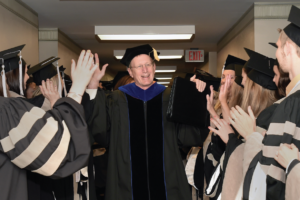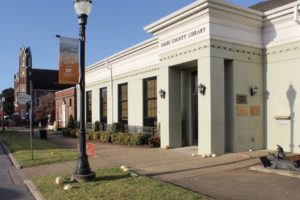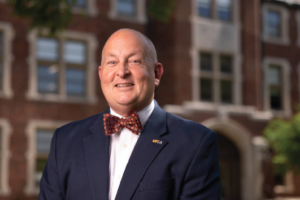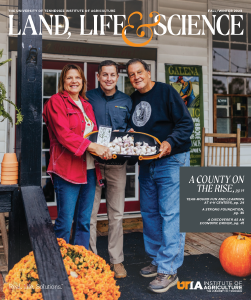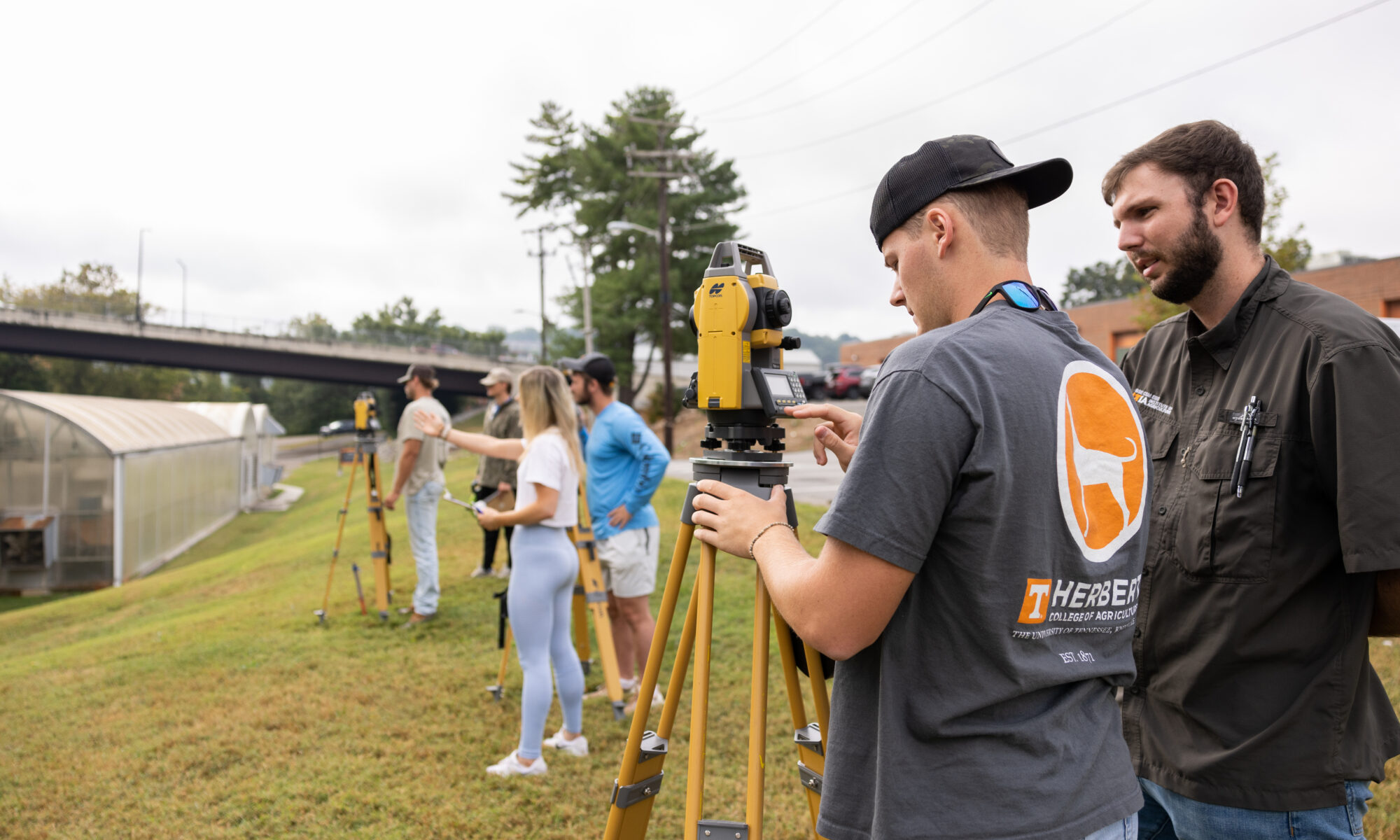
How the UT construction science program builds future industry leaders
Every semester, students in the construction science and management program in the Herbert College of Agriculture polish their resumes for the much-anticipated career fair. It’s an opportunity for students enrolled in the program, based in the Department of Biosystems Engineering and Soil Science, to meet employers and make connections that could lead to internships or job offers, and it is highly competitive. For the companies, that is.
Camden Baker (BS Construction Science ’22) remembers the electric feeling of stepping into the career fairs. “They are almost like the Super Bowl,” he says. With, at times, more than ninety companies represented and a limited number of graduates, there was a feeling of urgency among the employers as they pitched their workplaces to the future construction industry professionals. “It was nice because we knew that the seniors were probably all going to walk out of there with multiple job offers,” says Baker, who received offers four months prior to graduation and even started his full-time job before walking across the stage.

So why are UT construction science graduates in such high demand? Certainly, the shortage of skilled professionals entering the construction industry workforce contributes to this. According to Associated Builders and Contractors, the number of construction managers in the United States has only increased by 2.1 percent since 2011, when the program was established. But Baker believes that, in addition to the wide gap these UT graduates are filling, there are many more factors that have led to the program’s 100 percent job placement rate.
“When I visit with the companies that have employed our students, I am frequently told that our graduates are polite, respectful, and ready to go to work. That makes me very proud of this program,” says professor John Buchanan, who was named director of the program in January 2023.
Nearly one year after earning his degree, Baker now works as a project engineer with the Christman Company in Knoxville. He oversees the workers on his site to ensure the accuracy, safety, and timeliness of the project.
At first, Baker says, there was a slight disconnect between himself and the older, more seasoned employees, ones who had worked their way up in the company.
“But they quickly realized that UT construction science enabled me to hit the ground running and taught me to speak the language of the industry,” Baker says. “We’re not going to go out there knowing everything, but the program has done a very great job at giving us the foundation we need to build off of and be successful in the industry.”
Construction science at UT has gained respect from industry leaders since its inception twelve years ago, due in part to the students’ high level of preparedness upon graduation.
Tony Boals, vice president of Wright Brothers Construction Company, Inc., frequently and eagerly hires UT construction graduates. He has been involved with the program for more than ten years, sitting on the advisory board alongside other industry leaders and providing guidance for the UT construction science curriculum.
“The department has been very open to industry input,” Boals explains. “The board has been able to speak into what is taught and inform on what subjects are most important for students to learn about in order to be best prepared to join the workforce.”
According to Boals, construction science at UT has set a high bar. Students coming out of the program are first-rate, with a strong work ethic, people skills, and overall competence that sets them apart.
“When you hire a UT student, they can come in and go right to work,” he says.
The program emphasizes the value of experiential learning through internships and hands-on classes, where students develop skills in standard industry practices such as material testing and land surveying. Throughout their time at UT, students become well-practiced in communication and other management skills that are in high demand throughout the industry.
As construction continues to boom throughout the nation, Boals explains that the need for construction managers will grow. “UT is filling that need,” he says, “and they’re doing it really well.”
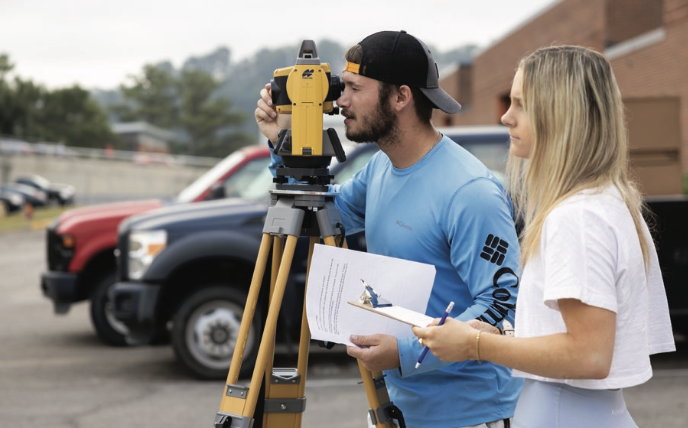
At the start of the 2023 fall semester, the degree program welcomed just under 300 students to campus, and that number is expected to continue to grow at rate of about 20 percent per year over the coming years, according to Angela Smith, a senior lecturer in the program who earned her engineering degrees from UT.
The quality of the students produced through UT construction science can largely be attributed to the quality of the faculty and staff teaching them. The small but mighty team of faculty and instructors represents diverse backgrounds, many with direct experience working in the field, and can connect real-life experiences with more theoretical university training.
The connectedness of UT faculty and staff to the construction industry is another large piece of the program’s success. Not only do companies attend the career fairs, their experienced professionals and leaders frequently act as adjunct professors and guest lecturers on specific topics for many of the classes.

During his time as a student, Baker says he greatly appreciated the opportunity to meet and become closely acquainted with the employers that would eventually hire him.
“We routinely, and I mean very routinely, would have vice presidents, owners, executive principals, and very known, very large construction companies come and do presentations simply because they have a great relationship with Charlie Parker or Angela Smith,” Baker noted.
Parker, director of UT construction science from 2014 to 2022, was instrumental in transforming the program into the success that it is today. His wealth of knowledge and focus on building relationships with leading construction company executives paved the way for students to reap the most benefit out of their time at UT.
Although he retired at the end of 2022, the impact and influence Parker had on the program and the Tennessee construction industry remains strong.
Those close ties with the industry have resulted in countless internship opportunities and job offers. Companies throughout the Southeast and across the country know about UT construction students, and they want to hire them.
Construction science and management fourth-year student Harley Valentine grew up going to construction sites with her dad. She recalls a kindergarten journal entry in which she sketched a picture of him holding a hammer and wrote the words, “One day, I’m going to be in construction like dad.”
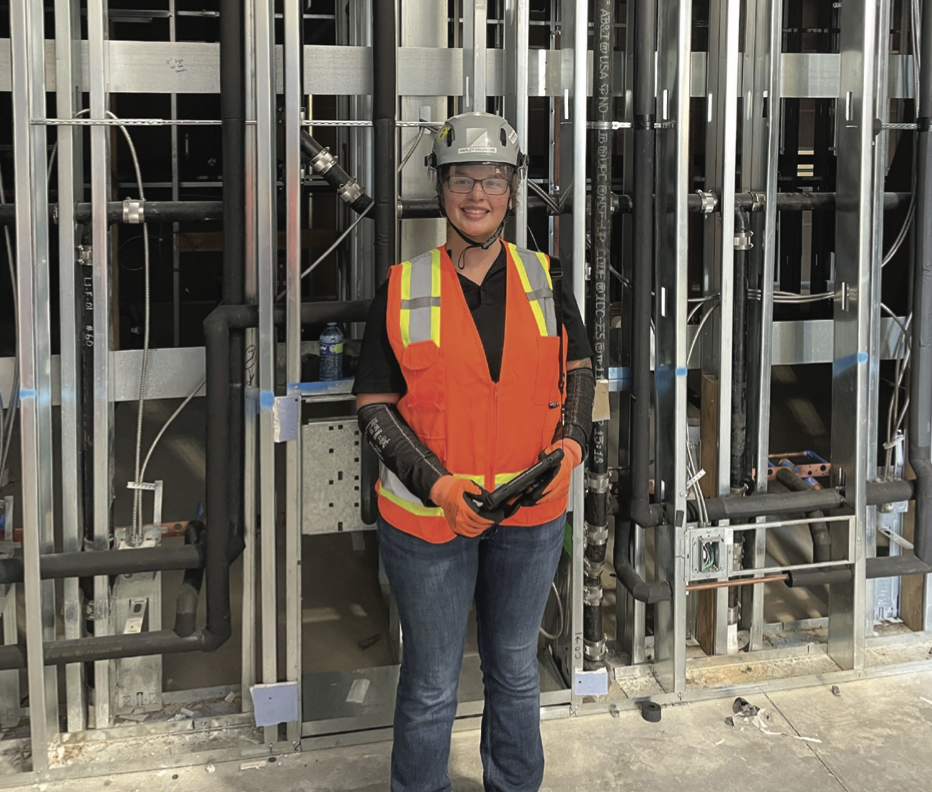
Harley Valentine completed two internships with Performing Contacting Inc. in Portland, Oregon, where she worked on various commercial construction sites. Photo courtesy of Harley Valentine.
“Just to see how that’s come full circle is so awesome,” Valentine muses.
She felt confident about the future as she entered her final semester in the construction science program in August 2023. She already had two internships under her belt, having traveled all the way to Portland, Oregon, the past two summers to work for Performance Contracting Inc. on commercial projects like a hotel and data centers for Facebook and TikTok.
With a shy smile, she admits, “I’ve actually already signed to return to Portland after graduation.”
Coming from the small town of Greeneville, Tennessee, Valentine never would have pictured herself moving across the country. For someone who had never left East Tennessee, the program broadened her horizons and opened doors she otherwise would never have known existed.
She says it all happened because of the support of her professors and instructors.
“They are really passionate about students getting out there and meeting the companies and just having as many opportunities as they can have,” Valentine says.
That passion for education, growth, and construction carries over from the UT construction science faculty and staff into the program, itself, creating a family- like culture with like-minded students who not only help and encourage one another, but also share in the excitement about the field they are preparing to enter.
For Candido Garcia Jr., the welcoming and supportive atmosphere of the construction science and management program at UT is what initially drew him in.
Garcia, currently in his third year, is a first- generation student. When he arrived at UT, he says he found the campus large and intimidating. “It was a terrible feeling,” he says. “I really had to navigate campus and figure things out on my own.”
He had not yet declared a major, and because his brother was involved in construction, Garcia decided to attend a construction science interest meeting. What he found there was exactly what he was looking for, he says. Two years later, Garcia feels confident and secure in the community he has built within the construction science program on the UTIA campus.

“People in this major are willing to help each other out because we all share a similar goal of wanting to do what we love and make an impact,” Garcia says. “All of the professors are always there to help you and push you to do the best you can.”
For twelve years, students have flourished in UT construction science’s academic environment. As the need for construction managers throughout the country grows, the UT construction science and management program will continue to prepare hardworking, knowledgeable, enthusiastic young professionals to fill the gap in this essential workforce.
When Baker, as an alumnus, reflects on his time at UT, he says he is thankful for the foundation of knowledge he received, the opportunities presented to him, and the relationships he built. Now and into the future, he adds, he looks forward to playing an important role in such a crucial industry.
“There’s a lot of pride in construction,” Baker says. “I think that’s why we all do it, why we all show up every morning because at the end of the day, we know we took part in something bigger than ourselves.”
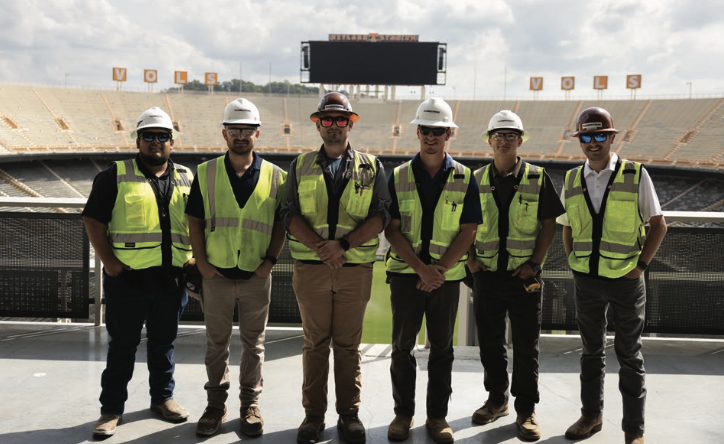
Explore More on
Features
MORE FROM THIS ISSUE



